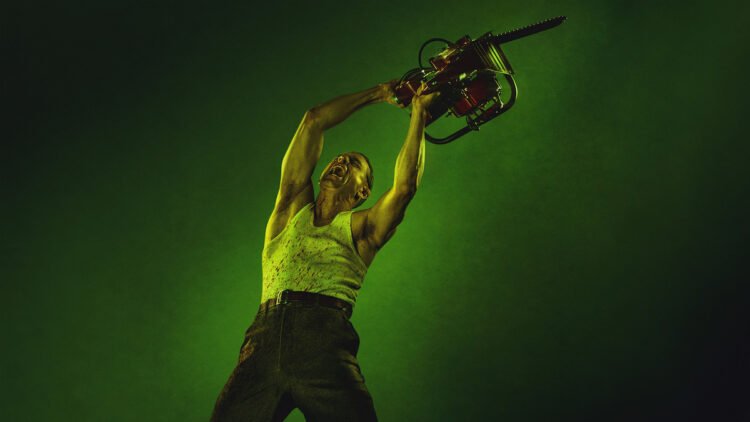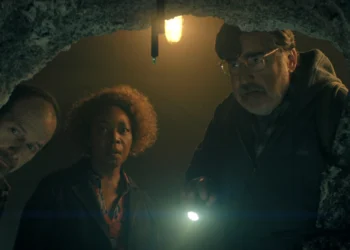Netflix and Ryan Murphy return with Monster: The Ed Gein Story, the third season in the acclaimed Monster anthology series. While the show ambitiously attempts to dissect the twisted psyche of one of America’s most notorious killers, it often strays from its central focus. The result is a chilling yet uneven journey through obsession, horror, and misplaced indulgence. With Charlie Hunnam headlining as Ed Gein, the drama offers moments of brilliance overshadowed by an overextended narrative that tries too hard to connect Gein’s influence to pop culture rather than exploring his inner torment.
Story
Set in the isolated farmlands of Wisconsin, the series follows Ed Gein, a reclusive man dominated by his devout and controlling mother, Augusta (Laurie Metcalf). Her strict religious beliefs and psychological manipulation push Ed into a suffocating existence. When Augusta dies, her absence leaves him fragmented, haunted, and consumed by disturbing fantasies. His fascination with corpses, identity, and transformation becomes the foundation for his gruesome crimes — acts that would later inspire cultural milestones like Psycho, The Texas Chain Saw Massacre, and The Silence of the Lambs.
Rather than centering tightly on Gein’s descent into madness, the show continuously veers into subplots. Viewers are taken through historical tangents, from Nazi Germany’s Ilse Koch to Hollywood’s Alfred Hitchcock and Tobe Hooper. While meant to illustrate Gein’s lasting impact, these diversions feel disjointed, diluting the emotional and psychological depth of the main narrative.
Performances
Charlie Hunnam transforms convincingly into Ed Gein, balancing the character’s childlike innocence with terrifying moral decay. His soft-spoken demeanor and gradual unraveling make him both pitiful and horrifying to watch. Laurie Metcalf is predictably strong as Augusta, embodying religious mania with unsettling precision, though the role offers few surprises for the seasoned actress.
Suzanna Son impresses as Adaline, the only person to connect with Ed’s morbid curiosity. Among the supporting cast, Vicky Krieps delivers a striking turn as Ilse Koch, while Tom Hollander’s portrayal of Alfred Hitchcock lacks the nuance the legendary filmmaker deserves. Joey Pollari’s Anthony Perkins subplot is compelling yet abruptly abandoned. Despite a strong ensemble, the sheer number of characters prevents the show from maintaining its intended intensity.
Behind the Scenes
Directed by Max Winkler and co-written by Ian Brennan, the season carries Ryan Murphy’s signature blend of stylized horror and psychological melodrama. However, this time the formula struggles under its own ambition. The production design effectively captures postwar Midwest gloom, and the cinematography embraces muted tones that mirror Gein’s deteriorating mind. Unfortunately, the pacing — stretched over eight episodes — weakens its impact, turning what could have been a tense character study into a fragmented anthology of references.
Final Verdict
Monster: The Ed Gein Story begins with promise but ultimately loses its footing. Hunnam’s performance is captivating, yet the writing’s tendency to overindulge in side stories and cultural callbacks leaves the series unfocused. While it succeeds in portraying the darkness that fueled Gein’s legacy, it rarely pauses to understand the man behind the myth.
For true-crime enthusiasts, the show offers disturbing visuals and strong performances, but for those seeking a concentrated psychological exploration, it feels more like a missed opportunity.
https://snooper-scope.in/monster-the-ed-gein-story-to-premiere-on-netflix-on-oct-3/























